Interest and Perspective
Our views depend on our priorities and the information we receiveWednesday, December 13, 2006
Trial judge gives in, OKs illegal military commission for Hamdan
The Military Commissions Act and the briefs of the parties present three questions: (1) As a matter of statutory interpretation and construction, did Congress actually succeed in removing our statutory habeas jurisdiction over the detainee habeas cases? (2) If so, is the Military Commissions Act a constitutionally valid “suspension” of the writ of habeas corpus within the meaning of the Suspension Clause, U.S. Const. art. I § 9 cl. 2? (3) If not, and if a “constitutional” writ of habeas corpus survives the Military Commissions Act, does Hamdan have a right to seek such a writ? The answers to these questions are “yes” to number (1) and “no” to numbers (2) and (3).This isn't over by a long shot. The court decides that the Military Commission Act is similar to the Anti-Terrorism and Effective Death Penalty Act in that both merely trim jurisdiction - the latter by limiting repeat petitions and the former by limiting the forum available. Next, the court decdes that Hamdan has no right to consitutitional habeas (apart from habeas rights the MCA abrogated) because he's not an American by citizenship or culture.
First, the decision that Hamdan has no right to constitutional habeas because he's not an American by citizenship or culture would seem to violate the spirit, if not the narrow holding, of _Rasul_ and merits reversal, despite the court's feeble attempt to distinguish that case. The judge has made out of whole cloth the rule that only "real" Americans get constitutional habeas; pointing to a few stale cases doesn't carry his point. It was also interesting that he didn't mention Korematsu at all.
Hamdan II, here we come.
UPDATE: Lyle Denniston at the Akin & Gump SCOTUSblog has the following interpretation; I believe we agree on the substance:
Here is the conclusion of Robertson's decision: "Congress's removal of jurisdiction from the federal courts was not a suspension of habeas corpus within the meaning of the Suspension Clause (or, to the extent that it was, it was plainly unconstitutiional, in the absence of rebellion or invasion), but Hamdan's statutory access to the writ is blocked by the jurisdiction-stripping language of the Military Commissions Act, and he has no constitutional entitlement to habeas corpus. Hamdan's habeas petition must accordingly be dismissed for want of subject matter jurisdiction."
Sunday, December 03, 2006
Jose Padilla Transport Video Capture Slides
As Deborah Sontag reports,
Padilla, fitted with blacked-out goggles, was videotaped by the government when he was allowed outside solitary confinement to see a dentist. One spring day during his three and a half years as an enemy combatant, Jose Padilla experienced a break from the monotony of his solitary confinement in a bare cell in the brig at the Naval Weapons Station in Charleston, S.C.Pictures of that transport:Several guards in camouflage and riot gear approached cell No. 103. They unlocked a rectangular panel at the bottom of the door and Mr. Padilla’s bare feet slid through, eerily disembodied. As one guard held down a foot with his black boot, the others shackled Mr. Padilla’s legs. Next, his hands emerged through another hole to be manacled.
Wordlessly, the guards, pushing into the cell, chained Mr. Padilla’s cuffed hands to a metal belt. Briefly, his expressionless eyes met the camera before he lowered his head submissively in expectation of what came next: noise-blocking headphones over his ears and blacked-out goggles over his eyes. Then the guards, whose faces were hidden behind plastic visors, marched their masked, clanking prisoner down the hall to his root canal.
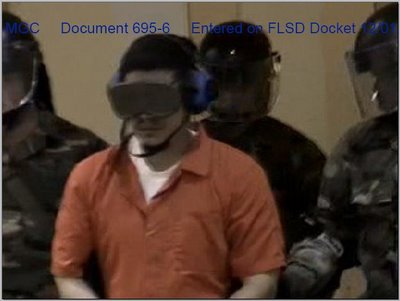
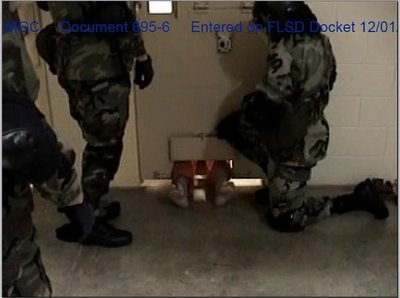
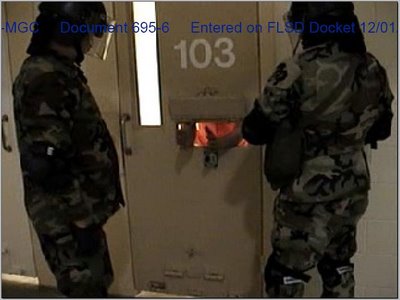
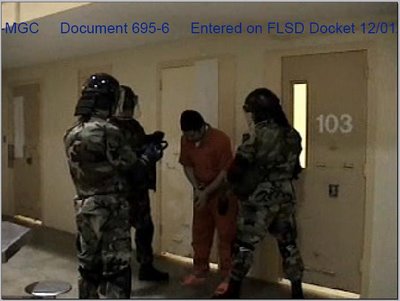


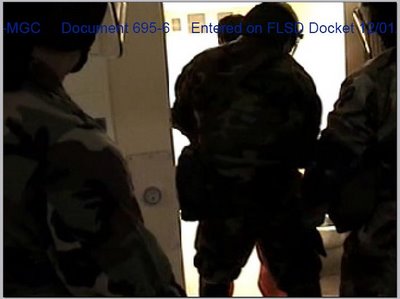
An expert psychiatrist for the defense has testified, after 22 hours of examination, that Mr. Padilla's treatment has made him unable to understand the proceedings against him and assist his lawyers.
It's important to understand that these pictures provide only a glimpse of Mr. Padilla's living conditions. Read the whole NYT story and place yourself in the shoes of this man who guards say behaves more like a "piece of furniture" than a human being.
Imagine this life. The man hasn't even been tried yet, and would be held under much better conditions if he had not been labeled an enemy combatant by the Administration (as opposed to the conditions seen here, or even state or federal prison). Padilla faces two charges that each only carry a maximum of fifteen years.
![[ACLU Execution Watch Counter]](http://www.aclu.org/graphics/dpcounter.gif)


Second, the court's discussion of suspension is just junk: basically, "Congress didn't unconstitutionally suspend the writ because if it did it would be unconstitutional because they didn't say there was a rebellion." Huhn???
The fact that Congress has been complicit in the President's tyranny should not deprive Mr. Hamdan of a real opportunity to challenge his detention.